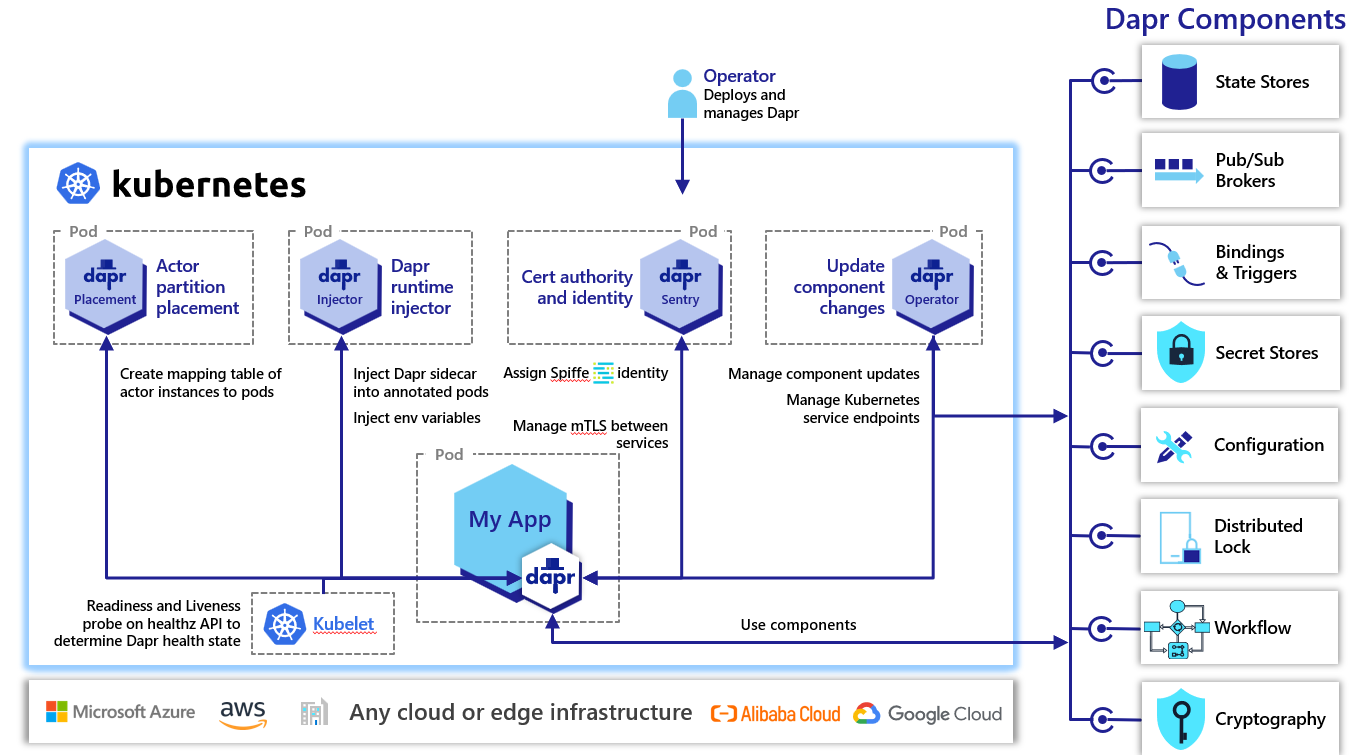Overview of Dapr on Kubernetes
Dapr can be configured to run on any supported versions of Kubernetes. To achieve this, Dapr begins by deploying the following Kubernetes services, which provide first-class integration to make running applications with Dapr easy.
| Kubernetes services | Description |
|---|---|
dapr-operator |
Manages component updates and Kubernetes services endpoints for Dapr (state stores, pub/subs, etc.) |
dapr-sidecar-injector |
Injects Dapr into annotated deployment pods and adds the environment variables DAPR_HTTP_PORT and DAPR_GRPC_PORT to enable user-defined applications to easily communicate with Dapr without hard-coding Dapr port values. |
dapr-placement |
Used for actors only. Creates mapping tables that map actor instances to pods |
dapr-sentry |
Manages mTLS between services and acts as a certificate authority. For more information read the security overview |

Supported versions
Dapr support for Kubernetes is aligned with Kubernetes Version Skew Policy.
Deploying Dapr to a Kubernetes cluster
Read Deploy Dapr on a Kubernetes cluster to learn how to deploy Dapr to your Kubernetes cluster.
Adding Dapr to a Kubernetes deployment
Deploying and running a Dapr-enabled application into your Kubernetes cluster is as simple as adding a few annotations to the pods schema. For example, in the following example, your Kubernetes pod is annotated to:
- Give your service an
idandportknown to Dapr - Turn on tracing through configuration
- Launch the Dapr sidecar container
annotations:
dapr.io/enabled: "true"
dapr.io/app-id: "nodeapp"
dapr.io/app-port: "3000"
dapr.io/config: "tracing"
For more information, check Dapr annotations.
Pulling container images from private registries
Dapr works seamlessly with any user application container image, regardless of its origin. Simply initialize Dapr and add the Dapr annotations to your Kubernetes definition to add the Dapr sidecar.
The Dapr control plane and sidecar images come from the daprio Docker Hub container registry, which is a public registry.
For information about:
- Pulling your application images from a private registry, reference the official Kubernetes documentation.
- Using Azure Container Registry with Azure Kubernetes Service, reference the AKS documentation.
Tutorials
Work through the Hello Kubernetes tutorial to learn more about getting started with Dapr on your Kubernetes cluster.
Related links
- Deploy Dapr to a Kubernetes cluster
- Upgrade Dapr on a Kubernetes cluster
- Production guidelines for Dapr on Kubernetes
- Dapr Kubernetes Quickstart
- Use Bridge to Kubernetes to debug Dapr apps locally, while connected to your Kubernetes cluster
Feedback
Was this page helpful?
Glad to hear it! Please tell us how we can improve.
Sorry to hear that. Please tell us how we can improve.